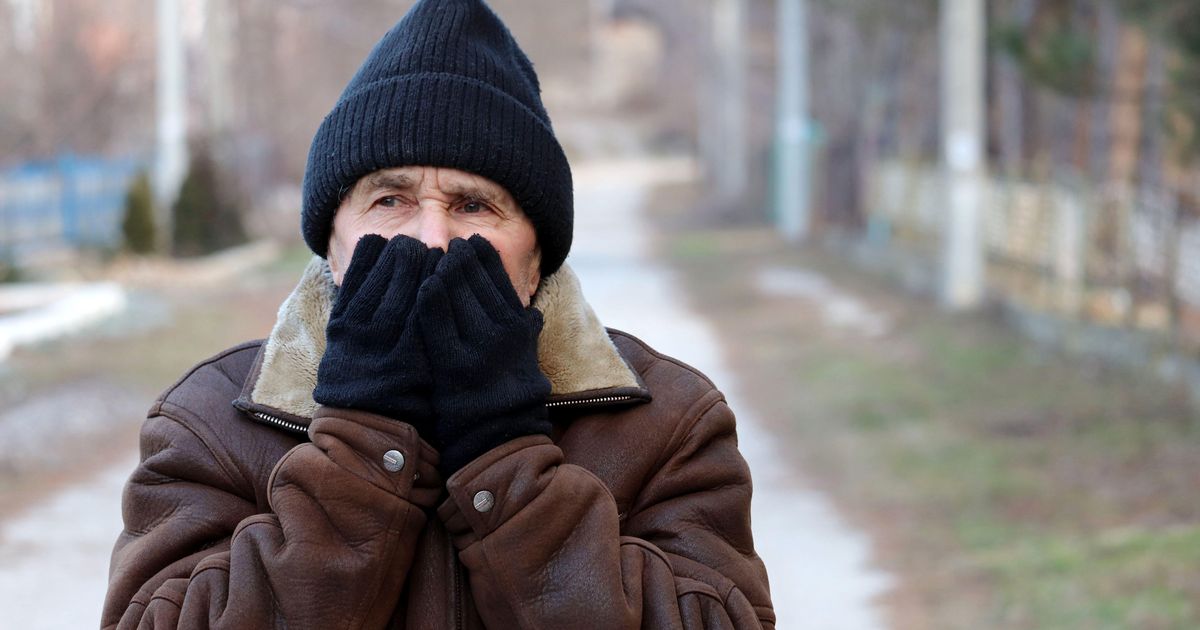Lifestyle
Doctor Explains Why Cold Sensitivity Increases with Age

As temperatures drop and winter approaches, many individuals, particularly older adults, struggle to stay warm despite wearing multiple layers. This increased sensitivity to cold can be attributed to various physiological changes that occur with age. Dr. Elise Dallas, a general practitioner at London General Practice, outlines several reasons why older individuals may feel the chill more acutely and offers practical advice for staying warm during the colder months.
Understanding Cold Sensitivity
As people age, a decrease in metabolic rate plays a significant role in how the body generates and retains heat. Dr. Dallas explains that the aging process often leads to a slower metabolism due to reduced lean muscle mass and hormonal changes. Specifically, thyroid function declines, particularly affecting free T3 levels, which are crucial for maintaining metabolic activity and heat production.
“Metabolism slows with age, and thermogenesis, the process of heat production, becomes less efficient,” notes Dr. Dallas. This inefficiency encompasses both basal metabolic heat and mechanisms like shivering and the activation of brown fat.
Factors Contributing to Cold Sensitivity
In addition to metabolic changes, the loss of muscle and fat with aging reduces the body’s insulation. Muscle mass typically declines due to sarcopenia, while subcutaneous fat also decreases, leading to diminished heat retention. Dr. Dallas elaborates, “Fat redistributes from limbs to central areas, which lowers peripheral warmth.”
Poor circulation is another concern for older adults. Blood vessels tend to stiffen over time, leading to less responsive vasodilation. “Peripheral circulation slows, especially in extremities, reducing heat delivery,” Dr. Dallas explains. This decline in circulation is compounded by chronic conditions such as hypothyroidism, anaemia, and diabetes, all of which can hinder the body’s ability to generate and distribute heat effectively.
Chronic health issues can exacerbate cold sensitivity. For instance, hypothyroidism reduces metabolic heat production, while anaemia limits oxygen delivery to tissues. Diabetes can lead to complications like peripheral neuropathy, which affects heat sensation and circulation. “Heart failure can also reduce cardiac output, limiting blood flow to the skin and extremities,” adds Dr. Dallas.
Medications can further complicate the issue. Older adults often take multiple medications, increasing the risk of side effects that may impair thermoregulation. Dr. Dallas points out that diuretics can cause dehydration, while certain antidepressants may affect temperature control. Additionally, vasodilators and beta-blockers can interfere with vascular tone and reduce circulation, further diminishing warmth.
Other age-related factors include thinner skin, reduced sweat gland function, lower levels of physical activity, and a less effective hypothalamic response. These factors collectively hinder the body’s ability to sense and respond appropriately to cold.
Health Risks of Cold Exposure
Dr. Dallas warns that exposure to cold temperatures poses serious health risks for older adults, including hypothermia, which can occur even indoors. Cold stress is linked to increased cardiovascular risk, worsened arthritis, and impaired cognitive and mobility functions, which heightens the risk of falls. Frostbite is also a concern during severe cold spells.
To combat these risks, Dr. Dallas offers practical advice for staying warm this winter. She recommends wearing thermal layers, including hats, gloves, and thick socks. Maintaining an indoor temperature of at least 20°C is crucial. Additionally, using heated blankets or hot water bottles safely, checking for drafts, and insulating windows and doors can help retain warmth.
Regular, warm meals and adequate hydration are also vital for maintaining body heat. Staying active indoors can boost circulation, further enhancing the body’s ability to combat the cold.
As the winter season progresses, understanding the factors that contribute to cold sensitivity and taking proactive measures can significantly improve comfort and health for older adults.
-

 Top Stories3 months ago
Top Stories3 months agoTributes Surge for 9-Year-Old Leon Briody After Cancer Battle
-

 Entertainment4 months ago
Entertainment4 months agoAimee Osbourne Joins Family for Emotional Tribute to Ozzy
-

 Politics4 months ago
Politics4 months agoDanny Healy-Rae Considers Complaint After Altercation with Garda
-

 Top Stories4 months ago
Top Stories4 months agoIreland Enjoys Summer Heat as Hurricane Erin Approaches Atlantic
-

 World5 months ago
World5 months agoHawaii Commemorates 80 Years Since Hiroshima Bombing with Ceremony
-

 Top Stories3 months ago
Top Stories3 months agoNewcastle West Woman Patricia Foley Found Safe After Urgent Search
-

 Top Stories5 months ago
Top Stories5 months agoFianna Fáil TDs Urgently Consider Maire Geoghegan-Quinn for Presidency
-

 World5 months ago
World5 months agoCouple Convicted of Murdering Two-Year-Old Grandson in Wales
-

 World5 months ago
World5 months agoGaza Aid Distribution Tragedy: 20 Killed Amid Ongoing Violence
-

 World5 months ago
World5 months agoAristocrat Constance Marten and Partner Convicted of Infant Murder
-

 Top Stories4 months ago
Top Stories4 months agoClimbing Errigal: A Must-Do Summer Adventure in Donegal
-

 Top Stories4 months ago
Top Stories4 months agoHike Donegal’s Errigal Mountain NOW for Unforgettable Summer Views









